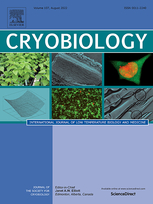
Vitrification des ovocytes de souris matures dans une solution de DMSO-6M contenant des glycoprotéines antigels : influence de la température.
Vitrification of mature mouse oocytes in a 6 M dimethyl sulfoxide solution supplemented with antifreeze glycoproteins: the effect of temperature.
Auteurs : O'NEIL L., PAYNTER S. J., FULLER B. J., SHAW R. W., DEVRIES A. L.
Type d'article : Article
Résumé
Of the oocytes cryopreserved following exposure to vitrification in 6 mole dimethyl sulfoxide supplemented with 1mg/ml antifreeze glycoproteins (solution known as VSD + AFGP) at room temperature, the overall percentage development to blastocyst was 20%. Exposure of oocytes to the VSD + AFGP on ice prior to cryopreservation yielded significantly improved rates of fertilization (94%) and overall development to blastocyst (66%) when compared with oocytes cryopreserved following exposure to the VSD + AFGP at room temperature. Rates of normality and development to blastocyst were also improved. Cryopreservation in 6 M dimethyl sulfoxide supplemented with 1 mg/ml AFGP resulted in poor rates of survival which were highly variable when exposure to cryoprotective agent (CPA) was performed at room temperature. Lowering the temperature of exposure to CPA prior to cryopreservation resulted in improved viability.
Détails
- Titre original : Vitrification of mature mouse oocytes in a 6 M dimethyl sulfoxide solution supplemented with antifreeze glycoproteins: the effect of temperature.
- Identifiant de la fiche : 1999-3905
- Langues : Anglais
- Source : Cryobiology - vol. 37 - n. 1
- Date d'édition : 08/1998
Liens
Voir d'autres articles du même numéro (9)
Voir la source
Indexation
- Thèmes : Influence du froid sur les cellules, tissus et organes
- Mots-clés : Vitrification; Cryoprotecteur; Cryobiologie; DMSO; Antigel; Souris; Oocyte; Cryoconservation
-
Cryopreservation of unfertilized mouse oocytes:...
- Auteurs : STACHECKI J. J., COHEN J., WILLADSEN S. M.
- Date : 12/1998
- Langues : Anglais
- Source : Cryobiology - vol. 37 - n. 4
Voir la fiche
-
Optimization of cryoprotectant loading into mur...
- Auteurs : KARLSSON J. O. M., SZUREK E. A., HIGGINS A. Z., et al.
- Date : 02/2014
- Langues : Anglais
- Source : Cryobiology - vol. 68 - n. 1
Voir la fiche
-
Vitrification of mature mouse oocytes: improved...
- Auteurs : O'NEIL L., PAYNTER S. J., FULLER B. J., SHAW R. W.
- Date : 05/1997
- Langues : Anglais
- Source : Cryobiology - vol. 34 - n. 3
Voir la fiche
-
CRYOPRESERVATION OF MOUSE OOCYTES: INFLUENCE OF...
- Auteurs : GARCÍA J.
- Date : 1986
- Langues : Anglais
- Source : Cryo-Letters - vol. 7 - n. 6
Voir la fiche
-
Ultrastructural changes in bovine oocytes cryop...
- Auteurs : FUKU E., XIA L., DOWNEY B. R.
- Date : 04/1995
- Langues : Anglais
- Source : Cryobiology - vol. 32 - n. 2
Voir la fiche
